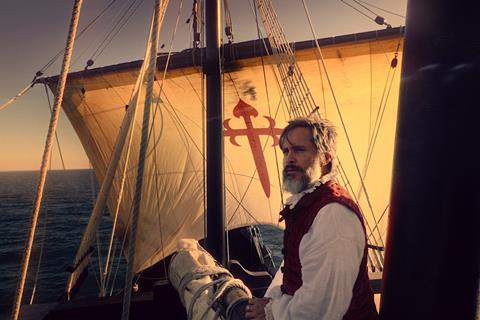The prolific Filipino auteur serves up a handsome, accessible historical biopic

Dir. Lav Diaz. Portugal/Spain/France/Philippines/Taiwan 2025. 160mins
The illusions and indignities of European colonial history have been amply mapped in cinema from Aguirre to Zama. Magellan, by Flilipino star auteur Lav Diaz, has much in common with both those films, in its ambitious merging of costume drama tropes and contemplative art-cinema stylistics. Diaz depicts the career of the Portuguese navigator and explorer Fernão de Magalhães (c. 1480-1521), a.k.a Ferdinand Magellan – and does so very much from a Filipino perspective.
A sardonic, detached but compelling study
The Cannes Premiere title is a departure for Diaz in several respects: by his usually super-spare standards, Magellan is handsomely mounted; it is one of his rare colour films; and it is his first collaboration with an international star, in this case Mexico’s Gael Garcia Bernal. More unusual yet, this dedicated specialist in extended duration delivers a satisfyingly complex drama in just over two and a half hours (although hardcore Lavistas will be pleased to know that a 9-hour cut also exists). This concision makes the haunting, visually imposing Magellan one of Diaz’s most viably exportable film to date, with Garcia Bernal’s presence very much adding to the appeal.
Shot in Portugal, Spain and the Philippines, the film covers some 16 years in Magellan’s career. Early episodes include a stay in Malacca, Malaysia in 1504, with an expedition intended to advance Portugal’s colonising project. It is on this journey that Magellan buys a young man (Amado Arjay Babon) as a slave; renamed Enrique, and speaking in Tagalog, he will become a key voice throughout.
Returning to Lisbon, Magellan meets Beatriz (Angela Azevedo), the young woman he will marry; he later wins royal patronage in Spain and sails to discover a new route to the Spice Islands of Indonesia. Over a long voyage, we see the inspired visionary become an obsessive, pitiless commander, not unlike the deranged conquistador of Aguirre Wrath of God – although Diaz’s style and Garcia Bernal’s muted performance produce a very different effect from Werner Herzog’s hallucinatory film.
Diaz even maintains his coolly detached approach at the end, when Magellan meets his match in Cebu, in the Philippines, running up against chieftain Raja Humabon (Diaz regular Ronnie Lazaro). It’s notable that Diaz shows us the catastrophic aftermath of battles, not the combat itself. This is partly, no doubt, for budget reasons, but is also in keeping with the downbeat register of his film-making, in which sustained calm occasionally allows for outbursts of melodramatic intensity.
Both photographed and edited by Diaz and Albert Serra collaborator Artur Tort, Magellan is paced very differently from most of the director’s work: the famous long takes are replaced by a relatively brisk succession of shots, with the narrative covering a great deal of incident. But an impression of slowness is created partly by the use of resonant silences in what, by the customary standards of historical drama, is a very taciturn piece. Much of the dialogue is given to the peoples of the various communities that Magellan comes into contact with, and Enrique becomes a kind of chorus figure, with solo scenes lamenting his state of exile and servitude.
Diaz largely eschews the traditional spectacle of historical drama, notwithstanding the imposing use of a galleon in the ocean sequences. It might seem perverse for him to shoot his star in wide shot for so much of the time, placing Garcia Bernal into the figures-in-a-landscape schema that is a Diaz constant. However he is framed, though, the actor exudes a sense of visionary determination and increasingly troubled authority, and – sporting a grizzled beard – vividly evokes the physical and mental wear and tear on a voyager’s being. He also performs convincingly in Portuguese, the film’s main language along with Tagalog.
Some of the narrative and the allusions, however, are not easy to follow; viewers schooled in the historical background will be at an advantage. But what comes across is a sardonic, detached but compelling study, rather echoing the stately intelligence of a much later Portuguese pioneer, Manoel de Oliveira.
Production companies: Rosa Filmes, Andergraun Films, Black Cap Pictures, Lib Films
International sales: Luxbox, festivals@luxbox.com
Producers: Joaquin Sapinho, Marta Alves, Albert Serra, Montse Triola, Paul Soriano, Stefano Centini
Screenplay: Lav Diaz
Cinematography: Artur Tort, Lav Diaz
Editors: Artur Tort, Lav Diaz
Production design: Lav Diaz
Main cast: Gael Garcia Bernal, Angela Azevedo, Amado Arjay Babon, Ronnie Lazaro
























